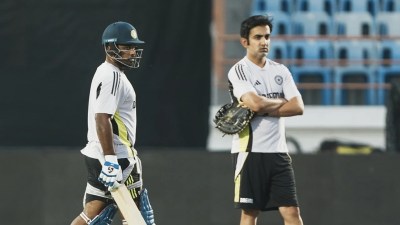According to these sources, while the current metric used by the Centre to supply doses on the basis of caseload, performance and wastage will remain, the states will have a say in formulating priority groups in the 18-44 years age group.

Some key changes likely from June 21 are:
* The Centre will step in to help channelise vaccine supplies to small private hospitals located in smaller towns and far-flung areas, and thus address the issue of geographical inequity.
Sources said that in the first two phases, many small private hospitals were part of the vaccination drive. However, this changed in May due to decentralised procurement. According to sources, in states like Odisha and Bihar, less than 20 private hospitals could negotiate agreements in May.
“For such hospitals, the state governments will undertake the exercise of demand aggregation; once the demand is aggregated, the Centre will help to channelise supplies to small hospitals and address geographical inequity,” said sources. This process of aggregation and channelising the doses to small hospitals will be a simultaneous exercise, sources added.
* Non-transferable electronic vouchers, approved by the Reserve Bank of India, will be introduced to enable people to help economically backward beneficiaries to get vaccinated at private hospitals.
“A person can issue a non-transferable electronic voucher, which will be RBI-approved. It can be used only for the person to whom it has been issued. It will be an electronic voucher, which can be downloaded on the mobile phone; it will be scanned at the vaccination site and the amount will be credited. It will also be captured on Co-win,” said sources.
Story continues below this ad
* Sources said the Centre will inform states in advance on how many doses they will receive in a month so that arrangements can be made to vaccinate the priority groups. This is being done to give advance visibility at the district level. The Centre will also provide data on supply of doses on different dates, sources said.
“The states are expected to communicate to the districts on the vaccine supplies in advance. This information should also be proactively disseminated among the people, and not create panic. States will have to communicate to districts on covering the different age groups. States will be in the lead; they will continue to do the granular planning and administering the priority groups,” sources said.
* The states will have a say in formulating priority groups in the 18-44 years age group, sources said. “They can have priority groups within the 18-44 age group; states would have a certain freedom. The finer blueprint will be made available in the revised guidelines,” sources said.
* Sources said the current metric used by the Centre to supply doses on the basis of caseload, performance, and wastage, will remain. “The formula will broadly remain the same; we would be uploading the revised guidelines. There will be certain positive metrics and one negative parameter, that is of vaccine wastage, based on which vaccines would be distributed,” sources added.
Story continues below this ad
Meanwhile, sources said that the states which have made payments to procure vaccines in June will get the doses as per the agreement. On pricing, sources reiterated that the Centre will continue to procure from both the Serum Institute and Bharat Biotech at Rs 150 per dose.
“The cost of a single dose of vaccine supplied by Serum Institute and Bharat Biotech is Rs 150; the advance orders are till July 31, and then from August to December. However, in the light of the announcement, NEGVAC (National Expert Group on Vaccine Administration for COVID-19) will be taking the advice of experts (on pricing),” sources said.
WHAT CHANGES FOR...
CENTRE
Currently, it gets 50% of total doses, allocates it to states for priority groups and 45+ for free. Now, it will procure 75% of doses and distribute to states to vaccinate for free the priority groups, and18-44-yr-olds.
STATES
Since May 1, had to procure 25% of doses from open market for 18-44 group. Now won’t be involved in procurement, will use doses from Centre.
Story continues below this ad
45+ GROUP
Will continue to get the biggest share of free vaccines. At private centres, will have to pay for the shots.
18-44 GROUP
From June 21, their jabs are free at government centres. At private hospitals, they will continue to pay.
Pvt HOSPITALS
Along with Centre, can deal with manufacturers. Can charge Rs 150 as administrative cost.









